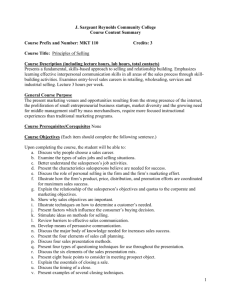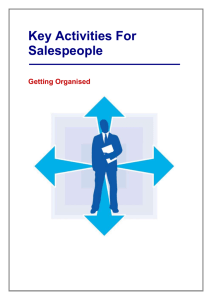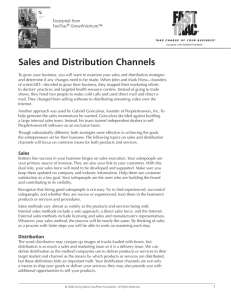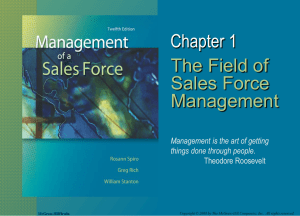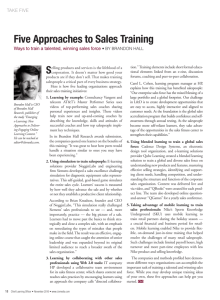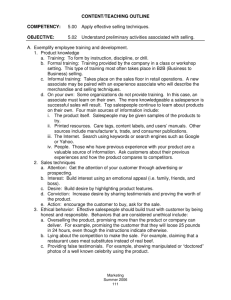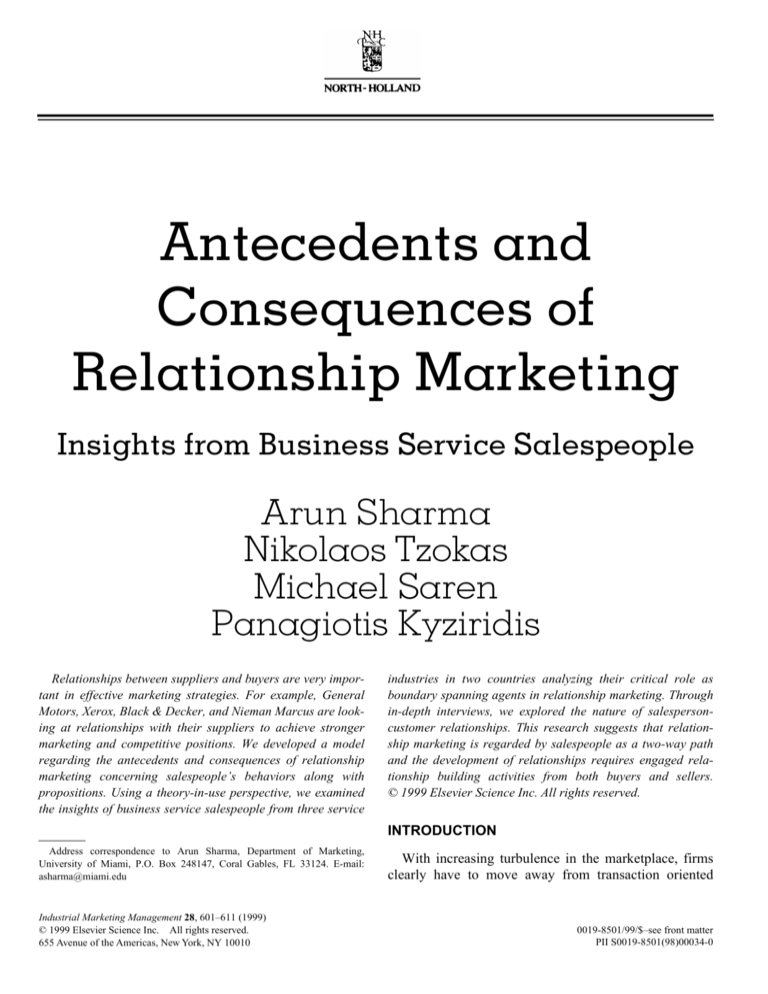
Antecedents and
Consequences of
Relationship Marketing
Insights from Business Service Salespeople
Arun Sharma
Nikolaos Tzokas
Michael Saren
Panagiotis Kyziridis
Relationships between suppliers and buyers are very important in effective marketing strategies. For example, General
Motors, Xerox, Black & Decker, and Nieman Marcus are looking at relationships with their suppliers to achieve stronger
marketing and competitive positions. We developed a model
regarding the antecedents and consequences of relationship
marketing concerning salespeople’s behaviors along with
propositions. Using a theory-in-use perspective, we examined
the insights of business service salespeople from three service
industries in two countries analyzing their critical role as
boundary spanning agents in relationship marketing. Through
in-depth interviews, we explored the nature of salespersoncustomer relationships. This research suggests that relationship marketing is regarded by salespeople as a two-way path
and the development of relationships requires engaged relationship building activities from both buyers and sellers.
© 1999 Elsevier Science Inc. All rights reserved.
INTRODUCTION
Address correspondence to Arun Sharma, Department of Marketing,
University of Miami, P.O. Box 248147, Coral Gables, FL 33124. E-mail:
asharma@miami.edu
Industrial Marketing Management 28, 601–611 (1999)
© 1999 Elsevier Science Inc. All rights reserved.
655 Avenue of the Americas, New York, NY 10010
With increasing turbulence in the marketplace, firms
clearly have to move away from transaction oriented
0019-8501/99/$–see front matter
PII S0019-8501(98)00034-0
Relationships can have both positive and
negative consequences.
principles of short term, discrete exchanges and begin the
development and maintenance of long-lasting relationships between firms and their customers [1, 2]. This is
due to an increased recognition of the importance of customer satisfaction, retention strategies, and relationship
marketing to the performance of a firm [3]. This shift is a
consequence of research addressing transaction oriented
marketing to research directed towards relationship marketing. In examining the marketing strategies associated
with long-term relationships, the activities of the salesperson as a boundary spanning agent are regarded as critical in enhancing long-term relationships [4].
Personal selling is by and large an ignored area of research within the growing services discipline. Traditionally, the published research in personal selling has a
product focus [5]. Selling of business services poses
some special challenges that are worthy of research attention for two reasons: 1) salespeople may need to use
unique sales strategies because customers perceive a
higher level of variability and uncertainty in the purchase
of services; and 2) the behavior of salespeople may influence customers’ perceptions of quality more in a service
setting than in a product context [5].
This paper describes a model that explicates the effect
of salespeople’s behaviors on relationships. Specifically,
salespeople’s behaviors and the antecedents and consequences of customer “relationships” are examined and
propositions developed. We concentrate on the antecedents of a relationship concerning the participation of
salespeople and customers. We also examine the consequences of a relationship with customers and discuss the
positive and negative consequences of relationships.
Twenty-two business service salespeople from three firms
and two countries were interviewed to develop a theoryin-use perspective. The results provide new insights into
the relationship building process, specifically on the critical role of buyers in the development of relationships.
RELEVANT LITERATURE
In this section, we review the nature of relationship
marketing and its importance. We then examine the importance of the salesperson in the development of long-term
relationships with customers. The research on salespeople’s behavioral elements and their effect on the quality
of relationships is then reviewed. Finally, to assure that
these relationships are maintained and prosper, understanding the salespeople’s perspective on the process is
important and is examined.
IMPORTANCE OF RELATIONSHIP MARKETING
ARUN SHARMA is Associate Professor of Marketing at the
University of Miami.
NIKOLAOS TZOKAS is a Senior Research Fellow in the
Department of Marketing at the University of Strathclyde,
Scotland.
MICHAEL SAREN is Professor of Marketing in the Department
of Marketing at the University of Strathclyde, Scotland.
PANAGIOTIS KYZIRIDIS holds a MSc in Marketing from the
University of Stirling, Scotland. Currently he is a sales and
marketing consultant in Athens, Greece.
602
Recent research has highlighted the importance of developing relationships for effective marketing [6]. It has
been suggested that academic research is undergoing a
paradigm shift in marketing from transaction marketing
to relationship marketing [2]. Regarding practice, firms
are also considering relationship marketing as critical for
sustaining a competitive advantage.
The primary motivator for long-term relationships is
satisfaction with past interactions. Satisfied customers
tend to buy products from the same supplier [7]. If customers have a long and satisfactory relationship, then a
single unsatisfactory experience does not influence the
relationship. For example, brand loyal customers, even
Salespeople have knowledge regarding
the sales process that translates
into their behaviors.
after an unsatisfactory experience, tend to repurchase the
product [8]. In contrast, the consequences of having dissatisfied customers are significant. In this case, customers may switch to a new supplier whose performance is
closer to their expectations, or reduce the amount they
are buying with their existing supplier [9]. The results of
the benefits of relationships are higher profitability. This
relationship has been tested in terms of the sales and
profitability [10, 11] and in terms of the impact of selling
costs [11].
PROPOSITION ONE
Relationships lead to higher levels of sales and profitability and lower selling costs.
Importance of the Role of Salespeople in
Business Services Buying
Since salespeople are the primary source of communication, the boundary spanning role of the service salesperson is critical in relationship marketing [5]. The
boundary spanning role of a salesperson is also highlighted by conflict that salespeople face when the selling
firm expects them to represent the firm’s interest and the
customer comes to rely on the salesperson to deliver
what is in the customer’s best interest.
Signaling theory would also suggest the importance of
salespeople’s behavior in the evaluation of a service as
signaling cues are specifically relevant when [12]: a) customers want to reduce the perceived risk [13]; b) customers are unable to evaluate quality [14]; c) quality is difficult or time consuming to evaluate [15, 16]; and d)
customers have a need for information [17].
Buying of most services would reflect all four conditions to some degree. Under these conditions, the behavior of the salesperson operates as a signal that serves as a
heuristic in assessing the quality of the merchandise being considered for purchase.
OUR MODEL
Salespeople as boundary spanning agents are the primary source of communication for customers in industrial, business, and retail market situations. To understand the effect of salespersons’ behavior on relationships,
this study integrates past research to present a conceptual
framework for long-term relationships (Figure 1). We
adapt a model of relationship development process proposed by Dwyer and his colleagues [18]. In this paper we
emphasize aspects of relationship building processes and
the consequences of effective relationships. Again, based
on earlier research, we further divide relationship building processes into salespeople behaviors, relationship enhancing behavior, and relationship threatening behaviors
[19]. We discuss each of these aspects individually. In
addition to past research, we also examine salespeople’s
perceptions as in the last two decades a selling perspective labeled as the “cognitive sales perspective” has
gained attention. The underlying premise of this perspective is that salespeople have knowledge regarding the
sales process that translates into their behaviors [20].
Therefore, by examining the knowledge structure of
salespeople, we can obtain insight into the “relationship
building” process.
RELATIONSHIP ENHANCING
SALESPEOPLE’S BEHAVIORS
In this section, we discuss three major salespeople’s
behaviors that have been highlighted by previous research – customer orientation, customer trust and continuous customer satisfaction.
603
Mutual commitment reduces the
uncertainties associated with opportunistic
behavior leading to a higher level of
relationship orientation.
Customer Orientation
Trustworthiness
Research in cognitive selling paradigm suggests that a
customer orientation distinguishes the performance of
salespeople [20]. The primary determinants of customer
satisfaction (and thus long-term relationships) are customers’ expectations of firm performance and the actual
service accomplishment. These service performance expectations can be based on sales presentations, best brand
norms and service norms [21]. Customer orientation suggests that salespeople understand customers’ needs and
expectation, and design and adapt services to match their
needs. Since customers’ needs evolve, successful salespeople constantly monitor the shifting needs of salespeople and adapt services to these evolving needs. Successful relationship marketing is associated with customer
oriented strategies [22–24].
Trust is regarded as critical in the context of relationship marketing [6]. The importance of trust in relationships has been empirically determined in the distribution
[6], merchandise buying [1], and services [25]. Doyle
and Roth [26] suggest that for relationship marketing,
salespeople need to engage in trust-building.
Proactive Behaviors
There is increasing research that pro-active behaviors
are critical in relationship management [23, 24, 27]. Proactive behaviors include a constant reevaluation of the
market as well as brand space of a service. In addition,
rather than customers seeking solutions to problems that
they may have, service marketers need to anticipate problems and develop service solutions for them [22]. Previous research has suggested that proactive behaviors generates attractive service innovations that genuinely enhances
the bundle of satisfaction that firms provide to their customers [28]. The rise of computers with increased graphical and
statistical analysis has made proactive behaviors easier with
increased productivity and profitability gains [29].
PROPOSITION TWO
Customer orientation, trustworthiness, and proactive
behaviors positively affects relationships.
Relationship Enhancing Behaviors
FIGURE 1.
604
Salespeople’s relationship behaviors.
Two common research themes discuss the issue of behaviors that enhance relationships. The first is the involvement of senior managers with mutual goal setting.
Relationships give a strong competitive
advantage to the seller.
The second is the involvement of the customer in the relationship process.
A mutual commitment to goals and top-level involvement are harbingers of strong relationships. Examples of
Corning and Walmart are provided as indicators of how
strong CEOs can influence the relationship building process of firms. The primary reason is that a mutual commitment reduces the uncertainties associated with opportunistic behavior leading to a higher level of relationship
orientation. Unlike products, where specific assets may
be used, services normally do not need idiosyncratic assets increasing the likelihood of defection. Therefore, research has shown a robust relationship between top-level
involvement, mutual commitment to goals, and relationships [23, 24, 27].
Customers’ attitude toward the salespeople and firm
should affect the nature of relationship. Research suggests that customer effort is directly related to performance and relationship evaluations [30–33]. Increased
effort and a positive attitude by customers enhances their
knowledge and also increases their commitment to the
firm [34].
PROPOSITION THREE
Top-level involvement, mutual commitment to goals,
and positive customer attitude and effort positively affects relationships.
Relationship Threatening Behaviors
Proposition one and two discuss relationship enhancing behaviors. Behaviors opposite to relationship enhancing behaviors should lead to relationship threats. There is
an additional factor—salesperson socialization that
should be understood. In our research we have found that
“service deliverables” and “nature of relationship” to be
important to customers. Within the relationship construct, “socialization” is becoming more important [35].
Within the framework of our model, the level of socialization between the customer and the salesperson is critical. Although important, when the level of socialization
exceeds the business demands, we expect it to be a threat
to relationships. These behaviors may include reliance on
friendship rather than the quality of service and being excessively demanding.
PROPOSITION FOUR
Demands based solely on level of socialization negatively affects relationships.
METHODOLOGY
The exploratory nature of our research and the need to
develop a theory-in-use perspective required the use of a
qualitative research methodology [36]. Qualitative research is a particularly useful research approach when
seeking to understand questions of process [37, 38]. To
test the basic framework of our model, information from
respondents was collected by means of personal in-depth
interviews. A total of 22 salespeople were interviewed.
The small sample may be an area of concern in an empirical study, but in the context of a theory-in-use perspective the sample is adequate.
We conducted field interviews with eight salespeople
from a Fortune 500 company in the U.S. that sells hightechnology services to business customers. To ensure
that the context of our research was not based only on the
values in the U.S., a national culture perspective was
adopted. Hofstede [39] identified four major dimensions
of national culture. These dimensions are individualism,
power distance, masculinity, and uncertainty avoidance.
Individualism refers to the relationship orientation of individual and collectivity within a society [39]. At one
end of spectrum are societies where individuals have
605
Trust reduces customers’ feelings of risk
and doubt.
loose ties among members, i.e., high levels of self-interest are manifested in individual members (e.g., U.S.). On
the other end are societies where individuals have strong
ties within groups, i.e., individuals hold group values and
beliefs and seek collective interests (e.g., Japan). Power
distance refers distribution of power within an organization [39]. Masculinity refers to the greater value on
achievement, tasks, and performance when compared to
people, quality of life, and helping others. Finally, uncertainty avoidance emphasizes how societies try to devise
strategies to deal with uncertainty.
The United States is regarded as high in individualism,
low in power-distance, medium in masculinity, and low
in certainty avoidance. To get a better understanding of
relationship processes in other countries, with different
national cultures, we also interviewed salespeople and
sales managers from two large service organizations in
Greece regarded as “customer oriented.” Greece is regarded as low in individualism, high in power-distance,
high in masculinity, and high in certainty avoidance. The
responses from both countries would allow us to suggest
a model valid in multiple national culture contexts.
In the Greek sample, the first firm was a top five advertising agency in Greece. The second firm was a travel
agency that is among the leaders in the Greek travel market. Interviews took place with six respondents (three account managers and three account directors) from the advertising agency, and eight respondents from the travel
agency (one sales coordinator, two sales managers, and
five salespeople).
A general discussion guide was used for all interviews.
We addressed salespeople’s perceptions regarding the establishment and maintenance of long-term customer relationships. To understand the underpinnings of long-lasting relationships, salespeople were asked to describe
their long-lasting relationship with an actual customer.
Data collected was transcribed, translated, and analyzed
by pooling together the process of relationship formation
between salespeople and their customers [36].
606
RESULTS
The results of the interviews revealed interesting insights. First, salespeople from both the U.S. as well as the
Greek sample had fairly similar responses. This came as
a surprise as we expected salespeople from different national cultures to emphasize different aspects of their relationship. For example, we would have expected U.S. to
emphasize the “deliverables” of the relationship, whereas
we expected Greece to emphasize the “nature of the relationship.” The data suggested that both samples felt that
a personal relationship was important but that “deliverables” were critical. The modified model is presented in
Figure 2. The specific responses are discussed below.
Proposition One: Relationships Lead to Higher
Levels of Profitability and Lower Selling Costs
The proposition was supported. Salespeople suggested
that the development and maintenance of some long-lasting,
high quality relationships are very important for a firm.
The primary benefits are in the areas of sales and profits,
Salespeople’s knowledge regarding relationship behaviors.
FIGURE 2.
Effective relationships are contingent on the
behaviors of both sellers and buyers.
less tough negotiations and positive word-of-mouth.
Salespeople feel that relationships give a strong competitive advantage to the seller. A satisfied customer who
feels very close to the seller is “cash in the company’s
coffers.” Therefore, through relationships, “the seller
gains a loyal customer who increases the quantity, frequency, or quality of buying.”
Salespeople felt that customers develop an understanding that a good profit for the seller is a reasonable motivating factor in order for salespeople to perform their
best. This is the result of the established trust of the buyer
based on the feeling that they are not being “cheated.”
Another obvious benefit of relationships is that it allows
for an in-depth knowledge of customers’ needs without
the use of sophisticated and costly research techniques.
Customers in relationships are “less tough negotiators.” The primary reason is that customers concentrate
on the high quality of service offered rather than the financial aspects of their business. Salespeople consistently felt that positive word-of-mouth was very good
outcome of relationships.
Proposition Two: Customer Orientation,
Trustworthiness, and Proactive Behaviors
Positively Affect Relationships
This proposition was also supported and the responses
were very common for all of the industries and nations.
The salespeople’s behaviors associated with effective relationship building are listed below.
CUSTOMER ORIENTATION. Salespeople consistently
stated that effective relationships call for salespeople
who are customer oriented. First, customer oriented
salespeople expend effort to understand customers’
needs and concerns. Second, customer oriented salespeople use their knowledge of customers’ needs and concerns to develop services that match customers’ needs.
Third, salespeople ensure the satisfaction of customers.
Salespeople feel that their behavior should be driven
by a “genuine concern” for the customer. It is essential
for salespeople to be very close to their customers, have
frequent contact with them, and develop an in-depth
knowledge and understanding of their business. Salespeople ensure their concern by understanding their
unique needs and making customers “feel very important.” Salespeople emphasized that for effective relationships, customers must also feel that the salesperson is expending effort to understand their needs and concerns.
Salespeople should offer customers services that take
into account their individual needs and concerns. This is
critical in long-lasting relationships as an account director of the advertising company stated: “A professional
salesperson gives excellent service to every customer and
exceptional service to the customer with whom he has a
long-lasting relationship.”
Our interviews imply that customer satisfaction is embedded in the notion of customer orientation. As a salesperson stated “We make happy customers; at a profit if
we can, at a loss if we must, but always happy customers!”
CUSTOMER TRUST. Salespeople suggest that trust is
critical in relationships. In addition, aspects of intimacy
and empathy are also suggested by salespeople. Salespeople explained that their efforts are directed toward
imbuing to customers a feeling of “security.” “The buyer
can feel secure in effective relationship, never having the
sense of being cheated and never doubting the quality of
the outcome of the service that they are receiving.” Salespeople suggested that an honest and consistent behavior
reflected salespeople’s genuine concern for customers’
needs and reduced customers’ feelings of risk and doubt.
Salespeople perceived each interaction with the customer as a testing ground of the relationship. They outlined the need for “spontaneity” and “inspiration” from
the salesperson in order for the customer to sense “honesty” and “authenticity” in the relationship. A salesperson stated: “If you pretend, then the customer will know
about it and the relationship will collapse.”
Effective salespeople also develop an intimacy with
their customers. This allows them to make customers
607
Control, motivation, and compensation
plans can be designed based on the
salespersons’ customers.
“feel at home.” As stated by a salesperson: “If someone
hears me talking over the phone with this customer, he
may think I am talking with a good friend.” Additionally,
empathy was also regarded as important. An account director stated: “If you do not go out for a beer, and you do
not feel like calling your customer at 2:00 a.m. for something that came to your mind, then no great ideas will be
produced.”
PRO-ACTIVE BEHAVIORS. Salespeople feel that “proactive behavior” is another key driver for effective relationships. This pro-active behavior was explained at two
levels, namely the customer and the salesperson’s firm
level. At the customers level, salespeople are continuously interacting with their customers to identify emerging needs. This allows salespeople to develop solutions
for customers even before they are aware of the problems. At the firm level, salespeople ensure that the service design and delivery match the requirements of customers. This customer-focus may increase the friction in
the organization as a salesperson observed the process to
be “fighting with my own company to secure the delivery
of the customer’s expected service.”
of goals, mutual influence, common dreams, loyalty, and
mutual satisfaction. The extensive use of the adjectives
“mutual” and “common” suggests that both the seller and
the buyer are “on the same side” with the feeling of
working together as a team toward a common goal
deeply embedded in their relationship.
As stated earlier, a surprising finding of the research
was that salespeople regard the attitude of customers as
critical in the relationship. As a salesperson observed, “a
warm, smiling customer motivates me to give my best.”
This theme was repeated by most salespeople. As another
salesperson observed “I go out of my way for customers
that are nice to me.” Similarly, “If a customer complains
a lot, I ignore him.” The above findings draw attention to
the fact that the interactive elements of “relationships”
influence the behavior of both customers and salespeople. Therefore, it seems that effective relationships are
contingent on the behaviors of both sellers and buyers.
Proposition Three: Top-Level Involvement,
Mutual Commitment to Goals As Well As
Positive Customer Attitude and Effort
Positively Affects Relationships
Proposition four was supported. Specifically, three issues emerged with respect to relationship threats—lack
of creativity, balance of professionalism and friendship,
and unreasonable demands. A concern among salespeople was that a long-lasting relationship may lead to “routine” and “non inspiring creative work.” Salespeople
suggested that after having secured an account, salespeople need to be aware that getting an account may negatively influence the quality of the service offered. In business services, keeping a relationship “fresh” and
“productive” is regarded as critical by salespeople. This
is more specific in the advertising sector where inspiration and creativity play a crucial role, and a long-lasting
The proposition was generally supported. Two interesting results were stated. First, no salesperson suggested
a top-level involvement. Second, customers’ positive attitude toward customers was regarded as being critical
for relationships. Salespeople suggest that a “relationship” is characterized by mutual interest rather than a focused self-interest. The phrases that we most often heard
were—positive attitude, mutual flexibility, common vision, common sense of partnership, mutual achievement
608
Proposition Four: Demands Based Solely
on Level of Socialization Negatively
Affect Relationships
relationship may lead to routine and non inspiring creative work. Salespeople also suggested that after having
secured an account, salespeople need to be aware that
getting an account may negatively influence the creativity of the service offered.
In addition, some salespeople suggested that although
they develop close and friendly relationships with some
of their customers, they are always aware that there is a
limit “in the balance of professionalism and friendship;
the friendship should never exceed the professionalism.”
The final problem highlighted by salespeople is that
some customers may become very demanding even posing irrational and unachievable demands. Customers try
to take advantage of a relationship at the expense of the
seller. These “irrational” demands are due to the customer’s confidence that the relationship is more important to the seller than the customer. Similarly, aggressive
selling techniques destroy relationships as “selling encounters should be viewed as receiving presents—when
we receive a present in a beautiful package, the best moment is before opening it.”
IMPLICATIONS
This research suggests that relational selling provides
direct and clear benefits to firms in the continuity of assigned jobs, diminishing importance of price during negotiations, increased learning, positive word of mouth
communications, and increased performance and efficiency from the point of view of the supplier.
This research has identified salespeople’s behaviors
that affect relationships. These behaviors were customer
orientation, customers’ trust, and pro-active behaviors.
Relationships were enhanced when customers had a positive attitude toward the salesperson and common goals
were established. Salespeople stated that a lack of freshness, lack of professionalism, and unreasonable demands
were threats to relationships. We suggest training to
make salespeople more customer oriented, specifically in
the selling of services.
The results also suggest that the role of salespeople is
more critical in a service setting than a product setting.
Salespeople perceive sales interactions as part of the service production and consumption process. In other
words, the sales encounter is a distinguishable, yet integral part, of the product/service that is also consumed.
Literature on sales management has mainly been concerned with the characteristics and behavior of the sales-
person and how they affect the outcome of the sales.
However, our findings direct attention to the fact that the
performance of salespeople is dependent on customers’
behavior and disposition during the sales encounter.
Relationship marketing promotes an intimate relationship between salespeople and their customers. A friendly
relationship that overcomes professionalism may jeopardize the business relationship. Customers may become
excessively demanding and therefore not profitable to the
firm. Also, salespeople may become overconfident in the
customers’ loyalty and therefore reducing the continuity
and novelty of their efforts to keep this customer satisfied.
Implications for Sales Managers
The results and the previous discussion have implications for marketing and sales managers. First, and most
important, it provides a method for describing the business services relationship processes. Second, it was also
shown that salespeople feel that specific sales actions enhance or reduce relationships. This provides marketers
with a procedure for relating behaviors of salespeople to
relationships.
The results suggest that presentation strategies be continuously adapted for customers. For example, when presenting to an established customer, the salespeople
should expend effort similar to new accounts. This is
critical as different customers may seek different types of
presentations. Some customers may prefer that the presentation is made by a sales team because it fosters the
impression that thorough planning has gone into the presentation and all-important issues will be addressed by
the presenters. Similarly, other customers may prefer individual or dyadic presentations and may be intimidated
by team presentations because it does not reflect their
own decision-making style.
The control, motivation, and compensation plans can be
designed based on the salespersons’ customers. For example, if a salesperson has relationships with primarily small
customers, he would have a steady flow of small orders. On
the other hand, salespeople who have relationships with
large government customers, will usually have long lead
times that result in infrequent but large orders. The first
group should have a higher commission to base pay ratio
when compared to the second group. Also, salespeople need
to be monitored over the type of calls. Salespeople need to
be evaluated on the content of the calls. Firms such as IBM
and Xerox have initiated customer satisfaction based incentive systems to better control the content of sales.
609
CONCLUSION
Our exploratory study has offered a conceptual framework and highlighted a number of issues that are expected to initiate and direct more research in the area of
relationship marketing and sales management in the services sector. Two major findings have implications for
future research. First, the role of salespeople is critical in
business services. Second, customers’ behavior is an additional and critical factor in relationships.
REFERENCES
1. Ganesan, Shankar: Determinants of Long-Term Orientation in BuyerSeller Relationship. Journal of Marketing 58(April), 1–19 (1994).
2. Sheth, Jagdish N., and Parvatiyar, Atul: The Evolution of Relationship
Marketing. International Business Review 4, 397–418 (1995).
3. Byrne, John A., Brandt, Richard, and Port, Otis: The Virtual Corporation.
Business Week 3304(February), 98–102 (1993).
4. Grewal, Dhruv, and Sharma, Arun: The Effect of Salesforce Behavior on
Customer Satisfaction: An Interactive Framework. The Journal of Personal Selling and Sales Management 11(3), 13–22 (1991).
16. Hoch, Stephen J., and Ha, Young Won Ha: Consumer Learning: Advertising and the Ambiguity of Product Experience. Journal of Consumer
Research 13(September), 221–233 (1986).
17. Nelson, Phillip: Information and Consumer Behavior. Journal of Political
Economy 78(2), 311–329 (1970).
18. Dwyer, Robert F., Schurr, Paul H., and Oh, Sejo: Developing Buyer-Seller
Relationships. Journal of Marketing 51(April), 11–27 (1987).
19. Sharma, Arun, and Parasuraman, A.: An Information Asymmetry Perspective on Personal Selling of Services: Research Propositions and Managerial Implications. Presented at the AMA Frontiers in Services Conference
at Nashville, October 5–7, 1995.
20. Macintosh, Gerrard, Anglin, Kenneth A., Szymanski, David M., and Gentry, James W.: Relationship Development in Selling: A Cognitive Analysis. The Journal of Personal Selling and Sales Management 12(Fall), 23–
34 (1992).
21. Cadotte, Ernest R., Woodruff, Robert B., and Jenkins, Roger L.: Expectations and Norms in Models of Consumer Satisfaction. Journal of Marketing Research, 14(August), 305–314 (1987).
22. Research Uncovers Abrasive Sales. Industrial Distribution 82(June), 89–
90 (1993).
23. Wilson, Elizabeth, and Woodside, Arch G: Marketing New Products with
Distributors. Industrial Marketing Management 21(February), 15–21
(1992).
5. Crosby, Lawrence A., Kenneth, R. Evans, and Coles, Deborah: Relationship Quality in Services Selling: An Interpersonal Influence Perspective.
Journal of Marketing 54(July), 68–81 (1990).
24. Samli, Coskun, A., Jacobs, Laurence W., and Will, James: What Presale
and Postsale Services Do You Need To Be Competitive. Industrial Marketing Management 21(February), 33–41 (1992).
6. Morgan, Robert M., and Hunt, Shelby D.: The Commitment-Trust Theory
of Relationship marketing. Journal of Marketing 58(July), 20–38 (1994).
25. Price, Linda L., Arnould, Eric J., and Tierney, Patrick: Going to Extremes:
Managing Service Encounters and Assessing Provider Performance. Journal of Marketing 59(April), 83–97 (1995).
7. Sharma, Arun, Grewal, Dhruv, and Levy, Michael: The Customer Satisfaction—Logistics Interface. Journal of Business Logistics 16(2), 1–22
(1995).
8. LaBarbera, Prescilla A., and Mazursky, David: A Longitudinal Assessment of Consumer Satisfaction/Dissatisfaction: The Dynamic Aspect of
the Cognitive Process. Journal of Marketing Research 20(November),
393–404 (1983).
26. Doyle, Stephen X., and Roth, George Thomas: The Use of Insight Coaching To Improve Relationship Selling. Journal of Personal Selling and
Sales Management 12(Winter), 59–64 (1992).
27. Ayliffe, Roy: Partnering: Will It Deliver for you? Logistics Focus
3(March), 7–9 (1995).
9. Pisharodi, R. Mohan, and Langley, C. John: A Perceptual Model of Customer Service Based on Cybernetic/Control Theory. Journal of Business
Logistics 11(1), 26–48 (1990).
28. Samli, Coskun A., and Frohlich, Cheryl L.: Service: The Competitive
Edge in Banking. Journal of Services Marketing 6(Winter), 15–22
(1992).
10. Reichheld, Frederick F.: The Loyalty Effect. HBS Press, Cambridge, 1996.
29. Austermann, Peggy: How Computers Change the Sales Process. Industrial
Distribution 85(November), 8–12 (1996).
11. Kalwani, Manohar U., and Narayandas, Narakesari: Long-Term Manufacturer-Supplier Relationships: Do They Pay Off for Supplier Firms? Journal of Marketing 59(1), 1–16 (1995).
12. Dawar, Niraj, and Parker, Philip: Marketing Universals: Consumers’ Use
of Brand Name, Price, Physical Appearance, and Retailer Reputation as
Signals of Product Quality. Journal of Marketing 58(April), 81–95
(1994).
30. Woodside, Arch G., and Davenport, J. William: The Effect of Salesman
Similarity and Expertise on Consumer Purchasing Behavior. Journal of
Marketing Research 11(May), 198–202 (1974).
31. Cardozo, Richard N.: An Experimental Study of Customer Effort, Expectation, and Satisfaction. Journal of Marketing Research 2(August), 244–
249 (1965).
13. Jacoby, Jacob, Olson, Jerry C., and Haddock, Rafael H.: Price, Brand
Name and Product Composition Characteristics as Determinants of Perceived Quality. Journal of Applied Psychology 55(December), 570–579
(1971).
32. Cardozo, Richard N.: Customer Satisfaction: Laboratory Study and Marketing Actions. Reflections in Progress in Marketing. American Marketing
Association, Chicago, IL, 1964, pp 283–289.
14. Rao, Akshay R., and Monroe, Kent B.: The Modernizing Effect of Prior
Knowledge on Cue Utilization in Product Evaluations. Journal of Consumer Research 15(September), 253–264 (1988).
33. Cardozo, Richard N., and Bramel, Dana: The Effect of Effort and Expectation on Perceptual Contrast and Dissonance Reduction. Journal of Social
Psychology 79(October), 55–62 (1969).
15. Allison, Ralph I., and Uhl, Kenneth P.: Influence of Beer Brand Identification on Taste Perception. Journal of Marketing Research 1(August), 36–
39 (1964).
34. Hanna, Nessim: Can Effort/Satisfaction Theory Explain Price/Quality
Relationships? Journal of the Academy of Marketing Science 6(Winter),
91–100 (1978).
610
35. Evans, Kenneth R., Gremler, Dwayne D., Schlacter, John L., and Wolfe,
William G.: The Impact of Salesperson Socialization on Organizational
Commitment, Satisfaction, and Performance in a Professional Service
Organization. Journal of Professional Services Marketing 11(2), 139–156
(1995).
37. Kirk, J., and Miller, M. L.: Reliability and Validity in Qualitative
Research. Newbury Park, Sage, CA, 1986.
36. Yin, R. K.: Case Study Research: Design and Methods, Applied Social
Research Methods, 5, Sage Publications, Newbury Par, CA, 1994.
39. Hofstede, Geert: Culture’s Consequence: International Differences in
Work Related Values. Sage Publications, Beverly Hills, CA, 1980.
38. Kohli, Ajay K., and Jaworski, Bernard J.: Market orientation: The Construct, Research Propositions, and Managerial Implications. Journal of
Marketing 54(April), 1–18 (1990).
611

